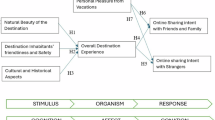Abstract
Electronic word-of-mouth (e-WOM) is considered a very powerful element in shaping the consumer's purchase decision. The tourism sector is no exception to the rule and the e-WOM on tourist destinations contribute in a decisive way to the decision to visit these destinations. The e-WOM can be studied in more detail, considering the quantity, quality and credibility of recommendations published online by consumers; however, this approach has not been used to explain the relationship between e-WOM and the decision to visit tourist destinations. This study aims to contribute to filling this literature gap, by approaching e-WOM in a tripartite way and then analyzing its influence on the intention to visit tourist destinations, through trust in these destinations. The results obtained from the partial least squares (PLS) structural equation modeling allow us to conclude that the three e-WOM components have positive direct effects on trust in the destination and positive indirect effects on the intention to visit the destination. In turn, trust has a direct positive effect on the intention to visit. From the results of this study, relevant theoretical, and managerial implications emerge.
Access this chapter
Tax calculation will be finalised at checkout
Purchases are for personal use only
Similar content being viewed by others
References
Bianchi, C., Milberg, S., Cúneo, A.: Understanding travelers’ intentions to visit a short versus long-haul emerging vacation destination: the case of Chile. Tour. Manage. 59, 312–324 (2017)
Litvin, S.W., Goldsmith, R.E., Pan, B.: Electronic word-of-mouth in hospitality and tourism management. Tour. Manage. 29(3), 458–468 (2008)
Stojanovic, I., Andreu, L., Curras-Perez, R.: Effects of the intensity of use of social media on brand equity. Eur. J. Manag. Bus. Econ. 27(1), 83–100 (2018)
Chen, Z., Lurie, N.: Temporal contiguity and negativity bias in the impact of online word of mouth. J. Mark. Res. 50(4), 463–476 (2013)
Vallejo, J., Redondo, Y., Acerete, A.: Las características del boca-oído electrónico y su influencia en la intención de recompra online. Revista Europea de Direccion y Economia de La Empresa 24(2), 61–75 (2015)
Abubakar, A.M., Ilkan, M.: Impact of online WOM on destination trust and intention to travel: a medical tourism perspective. J. Destin. Mark. Manag. 5(3), 192–201 (2016)
Liang, L.J., Choi, H.C., Joppe, M.: Understanding repurchase intention of Airbnb consumers: perceived authenticity, electronic word-of-mouth, and price sensitivity. J. Travel Tour. Mark. 35(1), 73–89 (2018)
Reyes-Menendez, A., Saura, J.R., Martinez-Navalon, J.G.: The impact of e-WOM on hotels management reputation: exploring trip advisor review credibility with the ELM model. IEEE Access 7, 68868–68877 (2019)
Abubakar, A.M., Ilkan, M., Meshall Al-Tal, R., Eluwole, K.K.: eWOM, revisit intention, destination trust and gender. J. Hosp. Tour. Manag. 31, 220–227 (2017)
Choi, C.S., Cho, Y.-N., Ko, E., Kim, S.J., Kim, K.H., Sarkees, M.E.: Corporate sustainability efforts and e-WOM intentions in social platforms. Int. J. Advert. 38(8), 1224–1239 (2019)
Yan, Q., Zhou, S., Zhang, X., Li, Y.: A system dynamics model of online stores’ sales: positive and negative e-WOM and promotion perspective. Sustainability 11(21), 6045 (2019)
Zainal, N.T.A., Harun, A., Lily, J.: Examining the mediating effect of attitude towards electronic words-of mouth (e-WOM) on the relation between the trust in e-WOM source and intention to follow e-WOM among Malaysian travellers. Asia Pac. Manag. Rev. 22(1), 35–44 (2017)
Cabrera, F.E., Amaya, M., Vaccaro Witt, G.F., Peláez, J.I.: Pairwise voting to rank touristic destinations based on preference valuation. Sustainability 11(21), 5873 (2019)
Morgan, R.M., Hunt, S.D.: The commitment-trust theory of relationship marketing. J. Mark. 58(3), 20–38 (1994)
Pavlou, P.A., Liang, H., Xue, Y.: Understanding and mitigating uncertainty in online exchange relationships: a principal-agent perspective. MIS Q. 31(1), 105–136 (2007)
Yerizal, Y., Abror, A.: The influence of e-WOM and image destination on revisit decision moderated by trust: a literature review. In: 2nd Padang International Conference on Education, Economics, Business and Accounting (PICEEBA-2 2018), pp. 441–448. Atlantis Press (2019)
Hair, J.F., Ringle, C.M., Sarstedt, M.: PLS-SEM: indeed a silver bullet. J. Mark. Theory Pract. 19(2), 139–152 (2011)
Sarstedt, M., Hair, J.F., Cheah, J.H., Becker, J.M., Ringle, C.M.: How to specify, estimate, and validate higher-order constructs in PLS-SEM. Australas. Mark. J. 27(3), 197–211 (2019)
Henseler, J., Ringle, C., Sarstedt, M.: A new criterion for assessing discriminant validity in variance-based structural equation modeling. J. Acad. Mark. Sci. 43(1), 115–135 (2015)
Author information
Authors and Affiliations
Corresponding author
Editor information
Editors and Affiliations
Rights and permissions
Copyright information
© 2023 The Author(s), under exclusive license to Springer Nature Singapore Pte Ltd.
About this chapter
Cite this chapter
Sousa, J., Fortes, N. (2023). The Influence of e-WOM on the Intention to Visit Tourist Destinations. In: Carvalho, J.V., Abreu, A., Liberato, P., Peña, A. (eds) Advances in Tourism, Technology and Systems. Smart Innovation, Systems and Technologies, vol 345. Springer, Singapore. https://doi.org/10.1007/978-981-99-0337-5_24
Download citation
DOI: https://doi.org/10.1007/978-981-99-0337-5_24
Published:
Publisher Name: Springer, Singapore
Print ISBN: 978-981-99-0336-8
Online ISBN: 978-981-99-0337-5
eBook Packages: Intelligent Technologies and RoboticsIntelligent Technologies and Robotics (R0)




